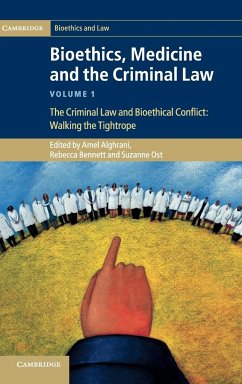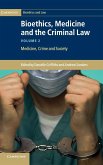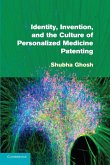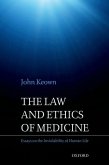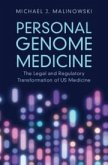Bioethics, Medicine and the Criminal Law
Herausgeber: Alghrani, Amel; Ost, Suzanne; Bennett, Rebecca
Bioethics, Medicine and the Criminal Law
Herausgeber: Alghrani, Amel; Ost, Suzanne; Bennett, Rebecca
- Gebundenes Buch
- Merkliste
- Auf die Merkliste
- Bewerten Bewerten
- Teilen
- Produkt teilen
- Produkterinnerung
- Produkterinnerung
This volume considers the ethical legitimacy of invoking the criminal law to regulate medical and scientific practice and bioethical issues.
Andere Kunden interessierten sich auch für
![Bioethics, Medicine and the Criminal Law Bioethics, Medicine and the Criminal Law]() Bioethics, Medicine and the Criminal Law115,99 €
Bioethics, Medicine and the Criminal Law115,99 €![Trust in Medicine Trust in Medicine]() Markus WolfensbergerTrust in Medicine34,99 €
Markus WolfensbergerTrust in Medicine34,99 €![Identity, Invention, and the Culture of Personalized Medicine Patenting Identity, Invention, and the Culture of Personalized Medicine Patenting]() Shubha GhoshIdentity, Invention, and the Culture of Personalized Medicine Patenting104,99 €
Shubha GhoshIdentity, Invention, and the Culture of Personalized Medicine Patenting104,99 €![Identity, Invention, and the Culture of Personalized Medicine Patenting Identity, Invention, and the Culture of Personalized Medicine Patenting]() Shubha GhoshIdentity, Invention, and the Culture of Personalized Medicine Patenting33,99 €
Shubha GhoshIdentity, Invention, and the Culture of Personalized Medicine Patenting33,99 €![COVID-19 and the Law COVID-19 and the Law]() COVID-19 and the Law96,99 €
COVID-19 and the Law96,99 €![The Law and Ethics of Medicine The Law and Ethics of Medicine]() John KeownThe Law and Ethics of Medicine165,99 €
John KeownThe Law and Ethics of Medicine165,99 €![Personal Genome Medicine Personal Genome Medicine]() Michael J MalinowskiPersonal Genome Medicine119,99 €
Michael J MalinowskiPersonal Genome Medicine119,99 €-
-
-
This volume considers the ethical legitimacy of invoking the criminal law to regulate medical and scientific practice and bioethical issues.
Produktdetails
- Produktdetails
- Verlag: Cambridge University Press
- Seitenzahl: 308
- Erscheinungstermin: 23. April 2018
- Englisch
- Abmessung: 235mm x 157mm x 21mm
- Gewicht: 599g
- ISBN-13: 9781107025127
- ISBN-10: 1107025125
- Artikelnr.: 36137600
- Herstellerkennzeichnung
- Libri GmbH
- Europaallee 1
- 36244 Bad Hersfeld
- gpsr@libri.de
- Verlag: Cambridge University Press
- Seitenzahl: 308
- Erscheinungstermin: 23. April 2018
- Englisch
- Abmessung: 235mm x 157mm x 21mm
- Gewicht: 599g
- ISBN-13: 9781107025127
- ISBN-10: 1107025125
- Artikelnr.: 36137600
- Herstellerkennzeichnung
- Libri GmbH
- Europaallee 1
- 36244 Bad Hersfeld
- gpsr@libri.de
1. Introduction - when criminal law encounters bioethics: a case of
tensions and incompatibilities or an apt forum for resolving ethical
conflict? Amel Alghrani, Rebecca Bennett and Suzanne Ost; Part I. Death,
Dying, and the Criminal Law: 2. Euthanasia and assisted suicide should,
when properly performed by a doctor in an appropriate case, be
decriminalised John Griffiths; 3. Five flawed arguments for decriminalising
euthanasia John Keown; 4. Euthanasia excused: between prohibition and
permission Richard Huxtable; Part II. Freedom and Autonomy: When Consent Is
Not Enough: 5. Body integrity identity disorder - a problem of perception?
Robert Smith; 6. Risky sex and 'manly diversions': the contours of consent
in criminal law - transmission and rough horseplay cases David Gurnham; 7.
'Consensual' sexual activity between doctors and patients: a matter for the
criminal law? Suzanne Ost and Hazel Biggs; Part III. Criminalising
Biomedical Science: 8. 'Scientists in the dock': regulating science Amel
Alghrani and Sarah Chan; 9. Bioethical conflict and developing
biotechnologies: is protecting individual and public health from the risks
of xenotransplantation a matter for the (criminal) law? Sara Fovargue; 10.
The criminal law and enhancement - none of the law's business? Nishat Hyder
and John Harris; 11. Dignity as a socially constructed value Stephen Smith;
Part IV. Bioethics and Criminal Law in the Dock: 12. Can English law
accommodate moral controversy in medicine? The case of abortion Margaret
Brazier; 13. The case for decriminalising abortion in Northern Ireland
Marie Fox; 14. The impact of the loss of deference towards the medical
profession José Miola; 15. Criminalising medical negligence David Archard;
16. All to the good? Criminality, politics, and public health John Coggon;
17. Moral controversy, human rights and the common law judge Brenda Hale.
tensions and incompatibilities or an apt forum for resolving ethical
conflict? Amel Alghrani, Rebecca Bennett and Suzanne Ost; Part I. Death,
Dying, and the Criminal Law: 2. Euthanasia and assisted suicide should,
when properly performed by a doctor in an appropriate case, be
decriminalised John Griffiths; 3. Five flawed arguments for decriminalising
euthanasia John Keown; 4. Euthanasia excused: between prohibition and
permission Richard Huxtable; Part II. Freedom and Autonomy: When Consent Is
Not Enough: 5. Body integrity identity disorder - a problem of perception?
Robert Smith; 6. Risky sex and 'manly diversions': the contours of consent
in criminal law - transmission and rough horseplay cases David Gurnham; 7.
'Consensual' sexual activity between doctors and patients: a matter for the
criminal law? Suzanne Ost and Hazel Biggs; Part III. Criminalising
Biomedical Science: 8. 'Scientists in the dock': regulating science Amel
Alghrani and Sarah Chan; 9. Bioethical conflict and developing
biotechnologies: is protecting individual and public health from the risks
of xenotransplantation a matter for the (criminal) law? Sara Fovargue; 10.
The criminal law and enhancement - none of the law's business? Nishat Hyder
and John Harris; 11. Dignity as a socially constructed value Stephen Smith;
Part IV. Bioethics and Criminal Law in the Dock: 12. Can English law
accommodate moral controversy in medicine? The case of abortion Margaret
Brazier; 13. The case for decriminalising abortion in Northern Ireland
Marie Fox; 14. The impact of the loss of deference towards the medical
profession José Miola; 15. Criminalising medical negligence David Archard;
16. All to the good? Criminality, politics, and public health John Coggon;
17. Moral controversy, human rights and the common law judge Brenda Hale.
1. Introduction - when criminal law encounters bioethics: a case of
tensions and incompatibilities or an apt forum for resolving ethical
conflict? Amel Alghrani, Rebecca Bennett and Suzanne Ost; Part I. Death,
Dying, and the Criminal Law: 2. Euthanasia and assisted suicide should,
when properly performed by a doctor in an appropriate case, be
decriminalised John Griffiths; 3. Five flawed arguments for decriminalising
euthanasia John Keown; 4. Euthanasia excused: between prohibition and
permission Richard Huxtable; Part II. Freedom and Autonomy: When Consent Is
Not Enough: 5. Body integrity identity disorder - a problem of perception?
Robert Smith; 6. Risky sex and 'manly diversions': the contours of consent
in criminal law - transmission and rough horseplay cases David Gurnham; 7.
'Consensual' sexual activity between doctors and patients: a matter for the
criminal law? Suzanne Ost and Hazel Biggs; Part III. Criminalising
Biomedical Science: 8. 'Scientists in the dock': regulating science Amel
Alghrani and Sarah Chan; 9. Bioethical conflict and developing
biotechnologies: is protecting individual and public health from the risks
of xenotransplantation a matter for the (criminal) law? Sara Fovargue; 10.
The criminal law and enhancement - none of the law's business? Nishat Hyder
and John Harris; 11. Dignity as a socially constructed value Stephen Smith;
Part IV. Bioethics and Criminal Law in the Dock: 12. Can English law
accommodate moral controversy in medicine? The case of abortion Margaret
Brazier; 13. The case for decriminalising abortion in Northern Ireland
Marie Fox; 14. The impact of the loss of deference towards the medical
profession José Miola; 15. Criminalising medical negligence David Archard;
16. All to the good? Criminality, politics, and public health John Coggon;
17. Moral controversy, human rights and the common law judge Brenda Hale.
tensions and incompatibilities or an apt forum for resolving ethical
conflict? Amel Alghrani, Rebecca Bennett and Suzanne Ost; Part I. Death,
Dying, and the Criminal Law: 2. Euthanasia and assisted suicide should,
when properly performed by a doctor in an appropriate case, be
decriminalised John Griffiths; 3. Five flawed arguments for decriminalising
euthanasia John Keown; 4. Euthanasia excused: between prohibition and
permission Richard Huxtable; Part II. Freedom and Autonomy: When Consent Is
Not Enough: 5. Body integrity identity disorder - a problem of perception?
Robert Smith; 6. Risky sex and 'manly diversions': the contours of consent
in criminal law - transmission and rough horseplay cases David Gurnham; 7.
'Consensual' sexual activity between doctors and patients: a matter for the
criminal law? Suzanne Ost and Hazel Biggs; Part III. Criminalising
Biomedical Science: 8. 'Scientists in the dock': regulating science Amel
Alghrani and Sarah Chan; 9. Bioethical conflict and developing
biotechnologies: is protecting individual and public health from the risks
of xenotransplantation a matter for the (criminal) law? Sara Fovargue; 10.
The criminal law and enhancement - none of the law's business? Nishat Hyder
and John Harris; 11. Dignity as a socially constructed value Stephen Smith;
Part IV. Bioethics and Criminal Law in the Dock: 12. Can English law
accommodate moral controversy in medicine? The case of abortion Margaret
Brazier; 13. The case for decriminalising abortion in Northern Ireland
Marie Fox; 14. The impact of the loss of deference towards the medical
profession José Miola; 15. Criminalising medical negligence David Archard;
16. All to the good? Criminality, politics, and public health John Coggon;
17. Moral controversy, human rights and the common law judge Brenda Hale.

